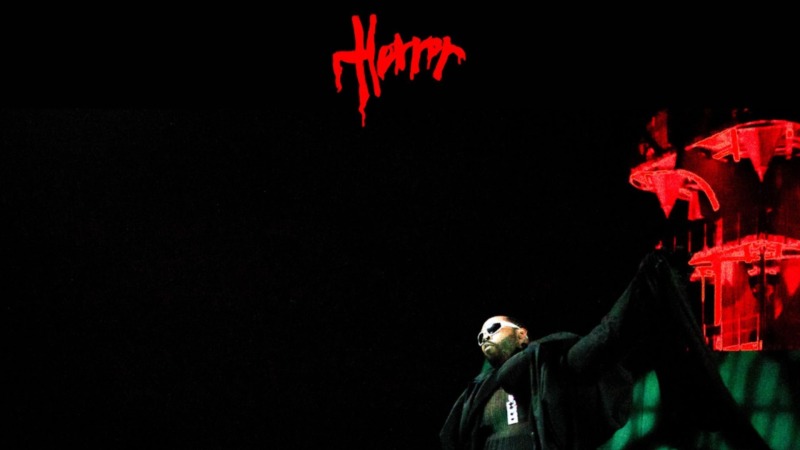Bartees Strange Finds Strength Amidst the Horror
The Oklahoma-raised musician's new album reaches grandiose heights, but that makes his stumbles all the more noticeable.

During the first few weeks of the COVID-19 lockdown, I watched horror movies obsessively—at least one a night, and preferably films I’d never seen before. Dawn of the Dead, Rosemary’s Baby and The Wicker Man were my companions during a time in which the only certainty was uncertainty. I told everyone that I found these movies comforting because they reminded me that even though there was a deadly virus ravaging the world, at least there weren’t zombies trying to feast on my brain or a strange island community hell-bent on sacrificing me in order to salvage their harvest. But the secret reason why I was glued to the TV screen, which I felt embarrassed admitting to even myself, was that I considered them training. If things went wrong—like horror movie wrong—these films could make the difference between me becoming mincemeat or making it through as a blood-soaked final girl. And I’m hardly the first in this line of thought; Randy from Scream studied horror movies like they were academic texts, as does Jade Daniels from Stephen Graham Jones’ Angel of Indian Lake series. Oklahoma-raised artist Bartees Strange also sees these films as potential survival guides—as a queer Black man living in a country built on institutional racism, life can take a frightening turn in the blink of an eye.
“You can’t hurt me, I been buried alive by the devil that’s in them hills,” Strange sings on the country-infused latter half of “Boomer,” from his acclaimed debut album Live Forever. There’s a resilience in his voice, but it’s hard-won; he explained in a Creative Independent interview that this part of the song was about growing up in Oklahoma and feeling “comfortable in your house, not outside.” Much of Strange’s new album, Horror, revisits that fight to feel strong in spite of overwhelming terror. He plumbs the depths of his fears—from racist violence to falling short in relationships—through the unexpected genre combinations that have become his calling card. Thematically, there’s a lot to chew on here, even if some of his sonic ideas feel more tired than those of previous releases.
“Too Much” opens the album with promise, graduating from lackadaisical indie rock to noisy, confident rap as Strange embraces his own power. It’s one of the album’s catchiest songs—particularly the little “ooh ooh ooh ooh oohs”—while showcasing the Strange of it all, that effortless melding of genres and a perfect marriage of content and form. Much of Horror takes inspiration from the music he listened to growing up, and the following track “Hit It Quit It” in particular is inspired by Parliament Funkadelic. He invokes P-Funk mythology (the group’s ethos and space age storytelling woven throughout their albums) over rubbery grooves, casting himself as an interstellar traveler who’s crash-landed on our hostile planet: “Bitch I’m smokin, just came out the ocean / Drippin wet, black as jet, Bootsy n****a, I’m the potion.” The chorus is operatic and grandiose, reaching glorious levels of camp that match the drama of the lyrics, as Strange compels himself to rival the very Earth itself: “Become a planet, feel gravity bend towards you.” On these songs, he shows off his lyrical prowess while also creating challenging, fascinating melodies.
-

-

-

-

-

-

-

-

-

-

-

-

-

-

-

-

-

-

-

-

-

-

-

-

-

-

-

-

-

-

-

-

-

-

-

-

-

-

-

-








































